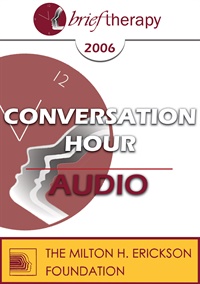BT06 Conversation Hour 01 - Aging - Peggy Papp, LCSW
- Average Rating:
- Not yet rated
- Topic Areas:
- Conversation Hours | Aging and Mortality
- Categories:
- Brief Therapy Conference | Brief Therapy Conference 2006 | Pioneers in Couples and Family Therapy
- Faculty:
- Peggy Papp, ACSW
- Duration:
- 55:23
- Format:
- Audio Only
- Original Program Date:
- Dec 08, 2006
- License:
- Never Expires.
Description
Description: This session focuses on the challenges of aging, including shifting gender roles, medical decisions, and evolving family dynamics. Topics include remarriage, retirement-related depression, and the growing need for therapy among elderly couples. The discussion highlights the importance of relationship-based support, improved care options, and innovative solutions like co-housing and intergenerational living to enhance seniors' well-being.
Educational Objectives:
- To describe philosophies of various practitioners and theorists.
*Sessions may be edited for content and to preserve confidentiality*
Credits
Handouts
| Timestamped Transcript (694.7 KB) | 15 Pages | Available after Purchase |
| Ericksonian Learning Snapshot (243.1 KB) | 2 Pages | Available after Purchase |
Faculty

Peggy Papp, ACSW Related Seminars and Products
PEGGY PAPP, A.C.S.W., is a therapist in private practice and Co-Director of the Brief Therapy Project at the Ackerman Institute for Family Therapy in New York City. She is recipient of the lifetime achievement award from the American Family Therapy Association and the award for distinguished contribution to Marital Family Therapy from the American Association for Marital and Family Therapy. Her latest book is Couples On the Fault Line.


